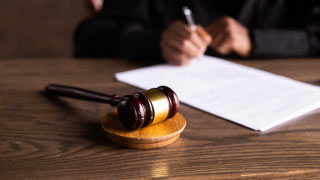What Is Court Reporting?
Understanding the Process and Its Importance in Litigation
November 10, 2025
Court Reporting
What is Court Reporting?
In litigation, every word matters. Accuracy in legal proceedings is critical to preserving the integrity of testimony, ensuring compliance with court procedures, and protecting due process. This is where court reporting comes in.
So, what is court reporting? It’s the process of capturing, preserving, and transcribing the spoken word during legal proceedings such as depositions, hearings, trials, and arbitrations. Professional court reporters create certified records that become part of the official case file. Attorneys, judges, and juries rely on these records to verify testimony and maintain accountability throughout the legal process.
Today’s legal professionals depend on trusted court reporting services that combine advanced technology with decades of experience. Modern court reporting blends real-time transcription, secure digital storage, and remote deposition capabilities, helping attorneys manage complex cases efficiently without compromising accuracy.
Key responsibilities include:
Modern court reporting services now integrate:
So, what is court reporting? It’s the process of capturing, preserving, and transcribing the spoken word during legal proceedings such as depositions, hearings, trials, and arbitrations. Professional court reporters create certified records that become part of the official case file. Attorneys, judges, and juries rely on these records to verify testimony and maintain accountability throughout the legal process.
Today’s legal professionals depend on trusted court reporting services that combine advanced technology with decades of experience. Modern court reporting blends real-time transcription, secure digital storage, and remote deposition capabilities, helping attorneys manage complex cases efficiently without compromising accuracy.
What Is Court Reporting? A Closer Look at the Process
At its core, court reporting involves three primary stages: capture, transcription, and certification.- Capture: During depositions, trials, or hearings, court reporters use stenographic machines, voice writing, or digital recording systems to capture every spoken word. Many professionals provide real-time transcription, allowing participants to follow testimony live on connected devices.
- Transcription: Following the proceeding, the reporter or transcription team converts the recorded material into a verbatim written record. This stage ensures the testimony, objections, and exhibits are clearly documented for case preparation, appeals, and discovery.
- Review & Edit: Once the initial transcript is prepared, it undergoes a detailed review to confirm accuracy, formatting, and completeness. Reporters or editors verify technical terminology, speaker identification, and timestamps to ensure the transcript meets court and client standards.
- Distribution: After review, the finalized transcript is securely delivered to the appropriate parties—typically attorneys, the court, or other authorized recipients. In some jurisdictions, additional certification may be required to confirm admissibility in court.
The Critical Role of Court Reporters in Legal Proceedings
Court reporters serve as impartial officers of the court. Their work ensures every deposition, hearing, or trial is recorded precisely.Key responsibilities include:
- Maintaining Accuracy: Court reporters capture every word, eliminating ambiguity in testimony or argument.
- Ensuring Neutrality: They act as objective recorders, providing an unbiased account of what was said.
- Protecting Due Process: Their transcripts preserve the right of all parties to review, challenge, and appeal decisions based on factual records.
How Technology Enhances Court Reporting
Technology has revolutionized the field, allowing legal professionals to conduct proceedings more efficiently while maintaining the same high standards of accuracy. However, while technology supports the process, it does not replace the expertise of human professionals.Modern court reporting services now integrate:
- Real-time transcription that allows attorneys to view and annotate testimony as it happens.
- Remote depositions through secure video platforms that connect participants across locations.
- Legal video services that provide visual context alongside written records.
- Electronic exhibit management, which allows exhibits to be shared, marked, and stored digitally.
Court Reporting vs. Legal Transcription
While both services involve converting spoken words into written text, they differ in purpose and how they are performed.- Court Reporting: Conducted live, often in real time, by trained professionals using stenographic machines, voice writing, or digital recording systems. Court reporters capture every word during proceedings such as depositions, trials, and hearings, producing accurate records that become part of the official case file.
- Legal Transcription: Involves converting pre-recorded audio or video—such as interviews, 911 calls, or internal meetings—into written text. These projects are often handled through legal transcription services that ensure clarity, accuracy, and secure delivery of transcripts for reference or documentation purposes.
Providing Local Court Reporters You Can Trust
Lexitas has experienced court reporters to cover your depositions and the local staff to make your job easier.
The Importance of Accuracy and Compliance
Accuracy in court reporting is a legal necessity. Even minor transcription errors can alter the meaning of testimony and affect the outcome of a case.To maintain integrity and compliance, court reporters:
- Follow state and federal certification standards.
- Adhere to confidentiality and data security regulations.
- Verify technical accuracy before delivering transcripts.
- Maintain impartiality and neutrality in all proceedings.
Remote and Hybrid Depositions: Expanding Access
The growth of remote and hybrid depositions has changed how legal teams approach litigation. Virtual depositions allow attorneys, witnesses, and court reporters to participate from anywhere, reducing costs and logistical challenges.Professional court reporters use secure platforms with end-to-end encryption to record and deliver transcripts safely. Features like synchronized video testimony, shared digital exhibits, and real-time viewing tools allow for smooth communication between all participants.
These advancements make court reporting more accessible without compromising compliance or accuracy.
Supporting Trial Preparation and Post-Trial Review
Beyond depositions, court reporters also play a vital role in trial preparation and appeals. Their transcripts provide attorneys with reliable references for:- Reviewing witness testimony.
- Preparing cross-examinations.
- Identifying inconsistencies in opposing counsel’s arguments.
- Supporting appellate filings.
Many legal professionals also rely on integrated trial support services to coordinate transcripts, exhibits, and video recordings into unified trial presentations. Combining technology with professional expertise allows teams to efficiently manage large volumes of information.
Finding Qualified Court Reporters
With so much at stake, legal professionals should work with certified and experienced court reporters. A reliable reporter must combine speed, accuracy, and technical skill with professionalism and discretion.To identify a qualified partner, refer to resources such as this guide on how to find a court reporter. When selecting a reporting service, these resources help legal teams evaluate credentials, certification standards, and technological capabilities.
The Broader Impact of Court Reporting on the Justice System
Court reporting is more than documentation. It’s the foundation of accountability within the justice system. Every transcript contributes to transparency, fairness, and the ability to appeal decisions based on verified records.According to the U.S. Bureau of Labor Statistics, court reporters and captioners play a key role in maintaining accurate records across courts and administrative agencies. Their work supports legal professionals and the public’s right to a fair and transparent judicial process.
Final Thoughts
For attorneys, corporate counsel, and judicial officials, understanding court reporting is essential to appreciating how it shapes modern litigation. Court reporting ensures every word spoken in a legal proceeding is captured precisely, preserved securely, and certified for accuracy.From remote depositions to real-time transcription and digital exhibit management, court reporting continues to evolve, leveraging technology to enhance, not replace, the expertise of trained professionals.
Court reporters remain the guardians of the record, ensuring the truth of every proceeding is preserved. Their work is not just procedural; it is fundamental to justice itself.
Related Resources

Articles
Court Reporting
What You Should Expect from Your Court Reporting Firm
Here are five things to expect from your court reporting firm to have your case go smoothly.
Read More
Articles
Court Reporting
Real Time Deposition Preparation Tips & How Realtime Depositions Work
Realtime court reporting is the live translation of a reporter’s stenotype writing into readable text.
Read More
Articles
Court Reporting
The Deposition Process Explained: A Legal Team’s Guide
Learn what legal professionals need to know about the deposition process, from scheduling and questioning to transcript review and post-depo strategy.
Read More